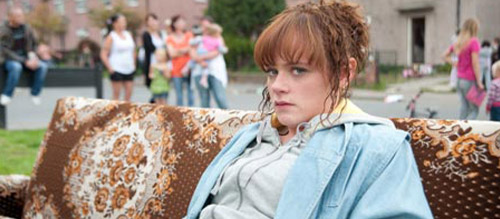The Arbor (2010) Documentary Review
The Arbor (2010)
Director: Clio Barnard
Starring: Manjinder Virk, Christine Bottomly, Natalie Gavin
Yorkshire-born Andrea Dunbar was, in the 1980s, one of the UK’s most promising playwrights and the well-renowned screenwriter of her own film adaptation Rita, Sue and Bob Too (1987), one of the country’s most unique, honest and challenging dramas ever put to screen. By 1990, at the age of 29, she was dead, leaving three children to three different fathers, and a wide range of issues and conflicts unresolved.
Clio Barnard’s deeply affecting feature debut The Arbor (2010) is without a doubt the most comprehensive post-mortem of the once great writing prodigy, its every frame engulfed in an immense sadness for the spoils of an impoverished life that spawned a great artistry.
The Arbor’s unapologetic insight into the posthumous tragedy of the Dunbar family, and the escalation of terror that breathes through every personal testimony, is played to devastating effect by Barnard’s presentation of actors miming direct-to-camera performances of words actually spoken by the Dunbars and those most closely involved with the family’s lives, making for a dramatised documentary film that feels as if it speaks the Dunbar family’s truth in much the same way as Dunbar’s own work had once done.
The film effortlessly flutters between a street-theatre production of Dunbar’s debut work, the titular “The Arbor”, and the testimonies outlined, to shine a light on the comparisons between Dunbar’s life and her work in a strong and very immediate manner, Barnard capturing the environment (the estate) that built Dunbar in the process. The way in which Barnard’s respect for Dunbar, theatre as an art form and the people of Dunbar’s home estate shines in a film that vitally remains in touch with its subjects and never seems to patronise us, the Dunbars or Andrea herself as much as outside media has often done over the years, makes for something quite extraordinary. Here, Barnard presents Dunbar warts and all, without victimising her or accusing her, only working to understand her – a woman whose creative efforts seem to have long been overlooked in terms of their significance.
The narrative of the documentary is not quite so deliberate but remains effective, taking a turn away from Andrea and towards her family in as strong of a narrative beat as a documentary can offer, that being the reveal of Andrea’s eldest daughter serving time for causing the death of her own child through manslaughter. The Arbor from this point on becomes latched to the daughter’s (Lorraine’s) story, and the circumstances of her relationship to her mother, her mother’s death and the estate on which she grew up, dedicating itself to uncovering what forged Lorraine into an addict and criminal. The focus on Andrea seems to go awry, but it gets to Lorraine so naturally that it’s barely noticeable, and it packs an immense emotional gut punch that elevates the material overall; outlining wider issues regarding gross governmental neglect to areas not-so-often presented in wider media.
In the spirit of Dunbar’s own work, The Arbor captures the essence of what it’s like to be a person with a history like that of the Dunbar family’s. It presents the truth of impoverished Great Britain, the forgotten corners of society and the different lifestyles that make up the bottom 10%. It is an insight into class, wealth and locality, but also a beacon of Andrea Dunbar’s immense talent. Made with all the maturity of a filmmaker far more experienced in the medium, The Arbor feels almost like a passing of the torch from Dunbar to Barnard as a major voice of underprivileged Bradford (and, more widely, the north); one that would go on to make the critical successes The Selfish Giant and Dark River in the years to come, Dunbar’s influence ringing strongly through each.
16/24


